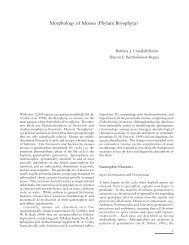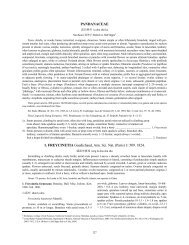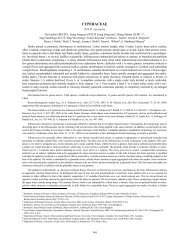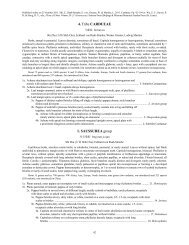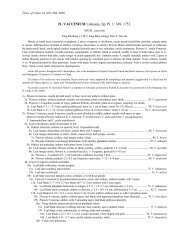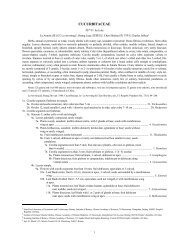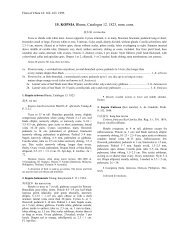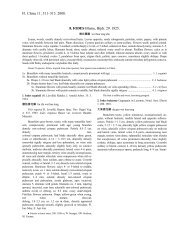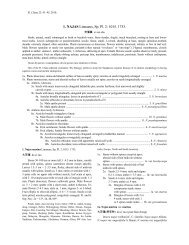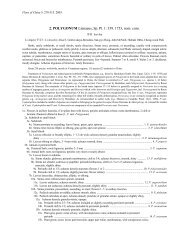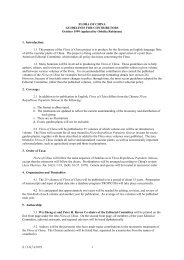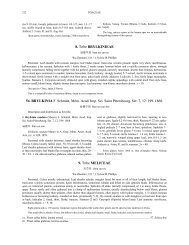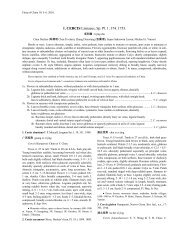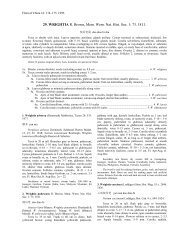Create successful ePaper yourself
Turn your PDF publications into a flip-book with our unique Google optimized e-Paper software.
286<br />
veined, apex obtuse; lateral sepals falcate-oblong, 14–18 × 4–5<br />
mm, 5-veined, apex acute; mentum 2–3 mm. Petals narrowly<br />
oblong or linear, 14–18 × 1.2–1.4 mm, 3-veined, apex obtuse;<br />
lip attached to column foot, broadly ovate, 6–9 × 3–5 mm,<br />
entire, strongly recurved, strongly veined, apex sagittate with 2<br />
Chrysoglossella Hatusima.<br />
EPIDENDROIDEAE<br />
small side projections. Column 3–5 mm, broadly winged; foot<br />
ca. 5 mm. Fl. Oct–Nov.<br />
Epiphytic on tree trunks at forest margins or in open forests;<br />
1400–1700 m. S and SW Yunnan [Bhutan, NE India, Myanmar, Thailand,<br />
Vietnam].<br />
96. HANCOCKIA Rolfe, J. Linn. Soc., Bot. 36: 20. 1903.<br />
滇兰属 dian lan shu<br />
Chen Xinqi (陈心启 Chen Sing-chi); Jeffrey J. Wood<br />
Herbs, terrestrial, glabrous. Rhizome slender, creeping; roots unbranched, villous, with root hairs, arising mainly from nodes.<br />
Shoot arising from base of terminal or subterminal internode, with a persistent, tubular, acute, membranous scale at each node; sterile<br />
shoots with 1 terminal leaf, alternating with fertile ones, terminal internode not swollen or differentiated. Leaf spreading to suberect,<br />
plicate-venose, ovate, with a crimped or crenulate margin. Inflorescence terminal, 1-flowered; floral bracts similar to rhizome scales.<br />
Flower resupinate, not opening widely; ovary cylindric, glabrous. Sepals and petals entire, free; lateral sepals decurrent on column<br />
foot. Lip adnate to column foot, 3-lobed, spurred at base; lateral lobes erect; mid-lobe porrect; callus of 2 low, linear ridges. Column<br />
clavate, with a foot; anther cap with 2 4-locular thecae, incumbent, glabrous; pollinia 8, stipe present; stigma subelliptic; rostellum<br />
flaplike.<br />
One species: SW China, S Japan, Vietnam.<br />
1. Hancockia uniflora Rolfe, J. Linn. Soc., Bot. 36: 20. 1903.<br />
滇兰 dian lan<br />
Chrysoglossella japonica Hatusima; Hancockia japonica<br />
(Hatusima) Maekawa.<br />
Pseudobulbs loosely arranged on rhizome, borne ca. 2 cm<br />
apart from each other, narrowly cylindric, 1–1.5 cm × 1.5–2.5<br />
mm. Petiole ca. 5 mm; leaf blade elliptic-ovate or ovate-lanceolate,<br />
5–7.5 × 2–3.3 cm, papery, base subrounded, apex acute.<br />
Inflorescence ca. 2 cm, base with membranous tubular sheaths,<br />
Apaturia Lindley; Pachychilus Blume.<br />
97. PACHYSTOMA Blume, Bijdr. 376. 18<strong>25</strong>.<br />
粉口兰属 fen kou lan shu<br />
Chen Xinqi (陈心启 Chen Sing-chi); Jeffrey J. Wood<br />
terminating in a flower; floral bracts cymbiform, ca. 2 cm.<br />
Flower pink; pedicel and ovary 2.5–3 cm. Sepals similar, free,<br />
slightly connivent, linear or narrowly oblong, ca. 20 × 3 mm, 3veined,<br />
apex acuminate. Petals similar to sepals, ca. 20 × 3–4<br />
mm, 3-veined, apex acuminate; lip elliptic-oblong, ca. 1.7 cm,<br />
3-lobed; lateral lobes ovate-triangular; mid-lobe subreniform,<br />
apex obtuse; disk with 3 longitudinal ridges; spur ca. 2.2 cm,<br />
apex obtuse. Column ca. 1.5 cm. Fl. Jul.<br />
Damp places in forests or along valleys; 1300–1600 m. S and SE<br />
Yunnan [Japan (Ryukyu Islands), N Vietnam].<br />
Herbs, terrestrial, with a distinct dormant period. Rhizome cylindric. Pseudobulb fleshy, cylindric or tuberlike with distinct fertile<br />
and vegetative shoots. Leaves 1 or 2, erect, linear, plicate-venose, papery, subtended by a few sterile sheaths. Inflorescence axis<br />
erect, leafless, with many brown sheaths along length, racemose; floral bracts persistent, suberect, lanceolate. Flowers subnutant,<br />
hairy; ovary hairy. Sepals subequal, not widely spreading, pubescent on both surfaces; dorsal sepal free; lateral sepals with oblique<br />
bases surrounding saccate lip base to form a blunt mentum. Petals free, linear, narrower than sepals, both surfaces pubescent; lip<br />
attached to apex of column foot, fleshy, porrect, 3-lobed in apical half, subgibbous or saccate at base but lacking a spur; disk<br />
papillose; lateral lobes erect; mid-lobe recurved at blunt apex; callus of several papillose or verrucose linear ridges from base to apex<br />
of blade. Column clavate, incurved and winged at apex, pubescent; anther cap terminal, pubescent; pollinia 8, clavate, waxy, without<br />
conspicuous viscidium and stipe; stigma transversely reniform-elliptic or dumbbell-shaped; rostellum obtuse. Capsule oblong,<br />
rostrate, ridged.<br />
About 20 species: tropical Asia and the Malay Archipelago, N Australia, New Guinea, and New Caledonia; two species (one endemic) in China.<br />
1a. Pseudobulbs subcylindric; flowers yellow, tinged with purplish or pink; mid-lobe of lip usually ± ciliate on<br />
margin ........................................................................................................................................................................... 1. P. pubescens<br />
1b. Pseudobulbs subglobose or ellipsoid; flowers yellowish; mid-lobe of lip densely long hairy on margin ................. 2. P. ludaoense<br />
1. Pachystoma pubescens Blume, Bijdr. 376. 18<strong>25</strong>.<br />
粉口兰 fen kou lan<br />
Apaturia chinensis Lindley; A. senilis Lindley; Pachychilus<br />
chinensis (Lindley) Blume; P. pubescens (Blume) Blume;<br />
Pachystoma brevilabium Schlechter; P. chinense (Lindley) H.



